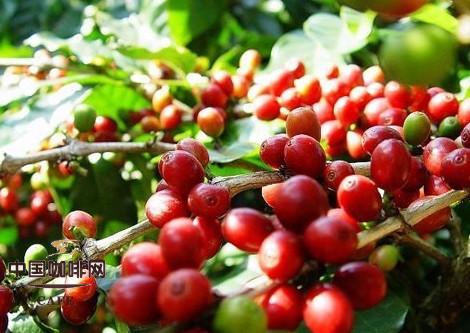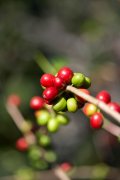Chinese Coffee Development Coffee drinking Chinese
No matter what kind of coffee, freshness is an important factor affecting the quality. When choosing and buying, grab one or two coffee beans and chew them in your mouth. If there is a clear sound, it means that the coffee beans are not damp, while the coffee beans with fragrant lips and teeth are the top grade, but it is best to pinch them with your hands and feel whether they are solid or not. Never buy empty-shell coffee.
Freshly fried coffee beans are not suitable for drinking right away. generally speaking, the best drinking period for coffee is a week after stir-frying, when the coffee is the freshest and the aroma and taste are the best.
In addition, the flavor of coffee beans is another consideration. The expert candidate for coffee beans is not necessarily to look at the size of the particles, but to grab a handful of individual coffee beans, about dozens of them, to see whether the color of each single bean is the same, and whether the particles are similar in size and shape. to avoid buying shoddy products disguised as mixed beans. But if it is a comprehensive bean, different size and color is a normal phenomenon. Heavy heat and medium-deep roasting will cause coffee beans to produce oil, but lightly roasted beans will show that they have gone bad, not only with reduced aroma, but also with astringent and sour taste. In short, when choosing and buying coffee, we should pay attention to its freshness, aroma and stale flavor. In late March 2014, coffee harvest is coming to an end in Yunnan Province, which accounts for more than 99% of China's coffee acreage and output. Under the influence of the international market, after more than two years of "price winter", the purchase price of coffee beans soared in 2014, from 13 yuan to 25 yuan per kilogram.
Although the surge in prices has boosted market confidence, China's coffee production fell to less than 60, 000 tonnes in the 2013-2014 season, down from 80, 000 tonnes in the previous season. In the absence of large coffee leading enterprises and local brands, the pressure to cut production has made it more urgent for China's coffee industry to "break through" from raw material producing areas.
Survey statistics show that the coffee planting area in Yunnan has grown from more than 300,000 mu in 2008 to more than 1.4 million mu in 2014, and its output has increased from about 30,000 tons to more than 80,000 tons in 2013, accounting for more than 99 percent of China's coffee planting area and output. It is the largest coffee producing area in China.
7 coffee industry insiders, throughout the past 20 years in Yunnan coffee price trend, almost every 10 years a price cycle. In 2010, the price of coffee in Yunnan reached 41 yuan per kilogram, a record high. From 2012 to early 2014, affected by the decline in international coffee futures prices, the price was once as low as 13 yuan per kilogram, and the coffee planting industry entered the "price winter" for two consecutive years.
At the end of January 2014, with the recovery of international coffee futures prices, Yunnan coffee prices also rose rapidly. "this past February, international coffee prices rose the most in 20 years, from 114 cents per pound on January 28 to 180 cents per pound on February 28."
There are probably three reasons for the rapid rise in coffee prices: first, the dry climate in Brazil, the world's largest coffee producer, since the end of last year, which is expected to affect coffee production; second, some coffee producing countries in Central and South America are affected by coffee rust, and coffee production is expected to decrease; third, coffee futures are in the doldrums for a long time, and coffee futures speculators deliberately drive up coffee prices and activate the coffee futures market.
The 2014 coffee harvest is drawing to a close, but the province's coffee output is less than 60,000 tons. Pu'er coffee production has also dropped by at least 30% on the basis of last year. " Despite the surge in purchase prices, the sharp decline in coffee production has cast a shadow over China's coffee industry.
Since 2014, Nestl é, Starbucks and Camille have stepped up efforts to open up raw material producing areas in Yunnan, and Yunnan small-grain coffee has also been sold to Europe, the United States, Japan, South Korea and more than 20 countries and regions, but on the whole, Yunnan coffee industry is still in its infancy, and the "breakthrough" of the industry is not optimistic.
At present, there is a lack of large-scale comprehensive leading enterprises in China's coffee processing industry, and local coffee brands are few, which do not play a leading role in market share and market evaluation at home and abroad. [1]
According to an online survey, 47% of netizens like to drink instant coffee, while 72% value coffee taste the most. Chinese people's habit of drinking coffee probably began after the 1990s, and now many urbanites have become dependent on coffee. Although the annual coffee consumption in China is only 200000 tons, the per capita consumption is increasing at a rate of 30%, which is expected to become the most potential coffee consumption country in the world.
Zhong Lirong, vice president of the China Coffee and Coffee Beverage Professional Committee, said in an interview: "in comparison, the proportion of Chinese people drinking pure coffee is not high. They usually choose to add coffee partners.

Important Notice :
前街咖啡 FrontStreet Coffee has moved to new addredd:
FrontStreet Coffee Address: 315,Donghua East Road,GuangZhou
Tel:020 38364473
- Prev

Coffee bean selection guide to select coffee beans to eliminate defective beans
No matter what kind of coffee, freshness is an important factor affecting the quality. When choosing and buying, grab one or two coffee beans and chew them in your mouth. If there is a clear sound, it means that the coffee beans are not damp, while the coffee beans with fragrant lips and teeth are the top grade, but it is best to pinch them with your hands and feel whether they are solid or not. Never buy empty-shell coffee. Freshly fried coffee beans are not suitable for immediate consumption.
- Next

Siphon pot (Syphon) Coffee extraction utensils commonly used in cafes
Siphon pot (Syphon) is one of the most popular coffee brewing methods in cafes. Principle: under the burning of alcohol lamp, when the water temperature in the lower container reaches 92 ℃, the water is sucked into the upper container with coffee powder, and after soaking and stirring, the coffee is returned. Degree of grinding: slightly thicker than powder, close to special fine granulated sugar. Siphon cooking has a chemical substance.
Related
- Beginners will see the "Coffee pull flower" guide!
- What is the difference between ice blog purified milk and ordinary milk coffee?
- Why is the Philippines the largest producer of crops in Liberia?
- For coffee extraction, should the fine powder be retained?
- How does extracted espresso fill pressed powder? How much strength does it take to press the powder?
- How to make jasmine cold extract coffee? Is the jasmine + latte good?
- Will this little toy really make the coffee taste better? How does Lily Drip affect coffee extraction?
- Will the action of slapping the filter cup also affect coffee extraction?
- What's the difference between powder-to-water ratio and powder-to-liquid ratio?
- What is the Ethiopian local species? What does it have to do with Heirloom native species?

